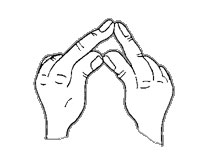the after-'party'

"athens park"
The documentary “Bastards of the Party” is a film that seems to lead you down an inevitable path… towards an interview with a well-known rapper from the LA gang culture speaking on ‘the life.’
But it doesn’t happen that way.
It isn’t that kind of film. It goes on without that rapper, without that moment… and that absence is a powerful thing.
It shows the film-maker’s focus and determination to tell a sober and true story about growing up as an average black kid in that gang culture, a culture he didn’t create, and his search for the origins of that culture. Although the story is told through many voices and many generations, the voice that holds it all together is Cle ‘Bone’ Sloan who grew up as an Athens Park Blood.
The choice to cut the film with a ‘cold opening’ without credits (showing only the title) withholds the fact that Sloan is also the director of the film. His face and story could be familiar to anyone who saw him on Larry King or read his story in FEDS magazine or spotted him in ‘Training Day’ (directed by ‘Bastards’ producer Antoine Fuqua) playing a character named ‘Bone.’ Portions of his Larry King interview are used in the film and it is wonderful to see Sloan’s poise on CNN carry over to HIS interviews with fellow gang members, black activists and author/historian/LA-expert Mike Davis.
One of the first jarring moments in the film occurs when you realize none of the current generation of Athens Park-area gang members knows how ‘the life’ came into existence. Davis’ book ‘City of Quartz’ becomes a jumping off point for Sloan’s research. Sloan initially wanted to go ‘all the way back to the 70s’ to tell the history of LA gangs but then he realized he had to go the 60’s and even to the 50s… even back to 1936… where he learns about black life in LA as documented by The California Eagle newspaper.
The history he discovers and presents to the audience is fascinating. The formation of the Slausons gang was a reaction to the white gang The Spookhunters and soon the Gladiators and the Businessmen became ‘defensive’ black gangs in the area of a white neighborhood called Compton. The transition of black leadership (or lack thereof) is traced clearly from these gangs through their adaptation to Black Panther militancy and/or ‘pro-Africa’ philosophy embodied by the US Organization. Some may be familiar with this story (or recently introduced to it in Jeff Chang’s ‘Can’t Stop Won’t Stop’). But listening to original gang members recall Black Panther ‘Bunchy’ Carter and seeing propaganda cartoons from Hoover’s COINTELPRO, truly embeds these stories in my brain as some of America’s most dramatic and ‘jaw dropping’ events.
Another strong story told here is the role work plays in holding communities together. Sloan eloquently sums up that role when he explains that young black men started gangs as a subculture of their daily lives… but when factory work disappeared and joblessness continued through the Reagan years, gangs became the ONLY culture. Sloan’s transition out of that culture is summed up when he says it wasn’t a ‘lifestyle’ but a “deathstyle.”
Towards the end of the film Sloan ponders a tactic to break the cycle of gang affiliation that symbolizes a new start for the children and the families in these neighborhoods. A homeboy in a hospital bed decides that he will not name his son after his own gang name… but will give him his OWN name. It is a simple, almost naïve decision but one with complex and potentially powerful repercussions. Sloan’s own grappling with the concept of honoring the dead through revenge is clearly shown on camera. After capturing the murder-scene of a close friend’s child on his video camera, Sloan makes a decision regarding the child’s murderer, seemingly before our eyes… and it is a moment more dramatic than most films can ever hope to portray.
Every kid who has ever listened to NWA or ‘The Chronic’ should see this film. Every parent who banned those records from their home should see it as well. But I hope the people from Sloan’s neighborhood have a chance to see ‘themselves’ in this film… and in Sloan… and in the context of American history… and as 'children' that can rediscover the powerful political ideas somehow lost between generations. The lack of ‘rap star power’ on screen allows regular folk to speak. Tragically some of them were dead before the film was complete. Luckily Cle Sloan has captured some of their words, hopefully to raise the next generation.
You have one more chance to see the film this week. Tue, Apr 26 at 5:30pm at the Regal Battery Park 3.


<< Home